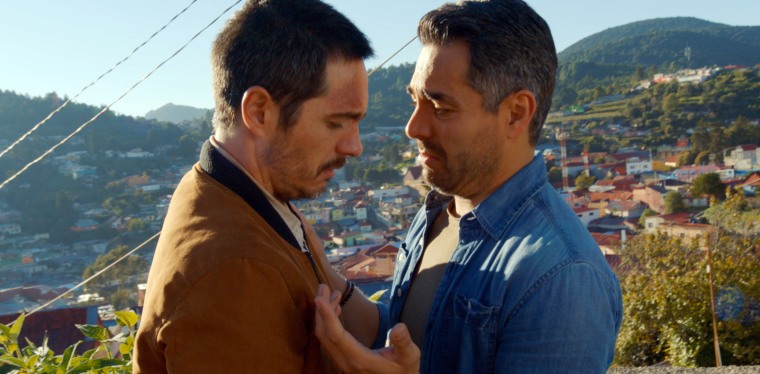Comedy road movie laughs at machismo, male rivalry and confronting an affair
A movie about a taxi driver and his passenger in Mexico requires viewers on a amusing experience close to the subject matter of a scorned partner and adultery to explore the meaning of love, sexual intercourse, friendship and do the job.
“The concept is to normalize the dialogue in between adult men, in between good friends, communicate about inner thoughts, and chortle a small at machismo—and not vilify women,” explained Mexican actor Mauricio Ochmann in an job interview with NBC Information.
“¿Y Cómo Es Él?” (titled “Backseat Driver” in the U.S.) premieres nationwide in choose American theaters on Friday. The movie tells the tale of an unemployed partner, Tomás (played by Ochmann), who travels from Mexico Town to Puerto Vallarta to confront Jero, a taxi driver (performed by Omar Chaparro) who is getting an affair with Tomás’s spouse (played by Zuria Vega).
Both of those men close up together on a 540-mile generate back again to Mexico Metropolis in Jero’s taxi, wherever they grow to be not likely mates alongside the way.
Ochmann states that the street trip not only normalizes how men can share their thoughts, but also problems the way people today consider about girls and adultery.
“In Mexico, typically, if a person is unfaithful, he is even applauded,” Ochmann mentioned. “But if the lady is unfaithful, they put disqualifying adjectives on her alternatively of obtaining a viewpoint that when this kind of celebration happens, it is a shared fact.”
“¿Y Cómo Es Él?” interprets to “What is he like?” Spanish-language viewers will acknowledge the phrase from a well known song by Jose Luis Perales, in which a gentleman asks his lover about his rival, the gentleman who has “robbed me of every thing.” The motion picture is a remake of a 2007 Korean movie.
Whilst the story focuses on the face among Tomás and Jero, Ochmann states the film in the end results in an possibility for the two people and viewers to crack out of their shells and obstacle the viewpoints that shape their daily realities.

The motion picture, directed by Argentine director Ariel Winograd (“The Heist of the Century”), was scheduled to be unveiled in 2020 but was delayed by the pandemic. It was produced this thirty day period in movie theaters in Mexico prior to its U.S. launch on Friday.
It was co-manufactured by actor Eugenio Derbez, 1 of the stars of the Oscar-winning motion picture “Coda.” Derbez also created the optimum-grossing Spanish-language film to date, 2013’s “Instructions Not Bundled,” which garnered $100 million.
Demonstrating the nontourist landscape
Puerto Vallarta has develop into an international vacationer location that appeals to Us citizens to its boutique motels, procuring outlets and beachside dining places.
But Mexican actor and comic Omar Chaparro states the film needs to present a side of the town that holidaymakers could not be familiar with.
“I assume that just about every town has its individual energy, spirit, which naturally becomes a character in motion pictures,” Chaparro explained to NBC Information. “In this situation, the director experimented with to show the heart of Puerto Vallarta. Not the vacationer area with all those big inns, but the small places to eat created out of wood and straw where by locals consume.”
Even though the film places the spotlight on a area side of Mexico, Chaparro suggests that its story is attractive to both Mexican and American viewers simply because it follows a common blueprint.
“If you spend focus, street motion pictures and buddy flicks always search for opposites where people start out hating just about every other and then make unique connections together the way,” he stated.
When requested about his character, Chaparro describes Jero as a “psychologist of the road” who enjoys owning discussions with passengers and providing them assistance.
Chaparro said Jero and Tomás need each and every other to locate a option to their problems. In this sense, the film holds up a mirror to viewers, urging them to glimpse for next possibilities in lifetime.
“Times adjust, and if you really do not adapt or reinvent yourself, you’re going to fall down a gap,” he said. “And that is what happened to the two of them.”
